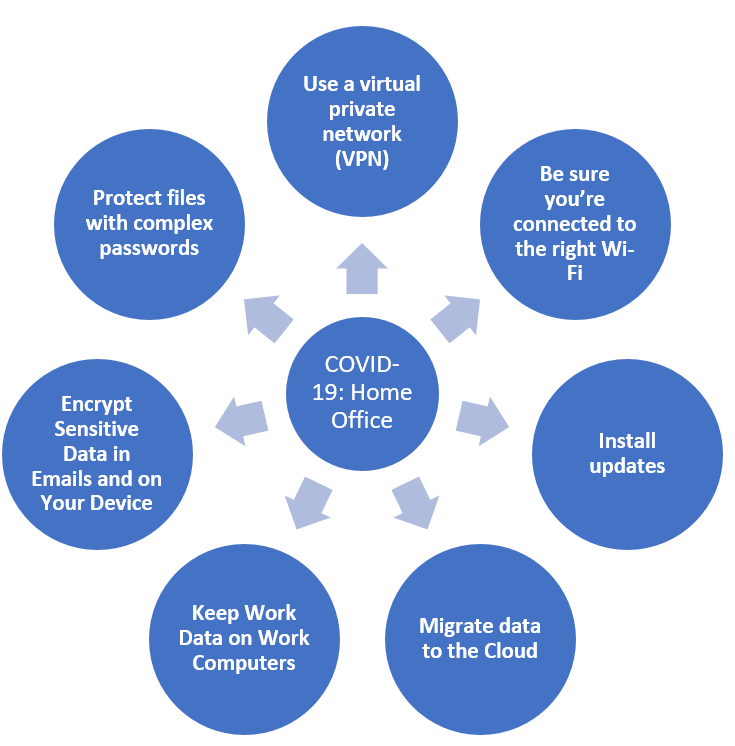Coronavirus: Safe Work Environment from Home office

The coronavirus outbreak has infected more than 250,000 people around the globe with 10254 death cases. Its spread has left businesses around the world to slash costs, lay off workers, pause investments and even declare bankruptcy in some server cases.
As the government has ordered us to remain indoors and self-quarantine to stop the spread of the coronavirus, many companies are obliged to send their staff on short-term work from home setup. Big tech companies, such as, Facebook, Google, Twitter, Salesforce and Amazon have already implemented remote working policies for many or all of their employees around the globe.
Making telecommuting work at scale will require companies to re-evaluate how technology can be used to produce the best outcomes from their workers without sacrificing any security or data breaches.
When it comes to enabling the largest possible number of employees to do their jobs remotely as far as possible, Company usually choose to give its employees an encrypted connection via remote desktop (RDP) and corporate VPN solutions so the remote users can directly connect to the organization’s network and servers. Therefore, a right preparation and setup is critical to avoid all problematic situations. In this time of sudden peak in VPN traffic, companies must ensure their security measurements against a remote attack in order to protect against the risks associated with different attack methods, such as phishing, credential theft and vulnerability exploitation.
A VPN provides protection, but it also presents an attractive target to attackers for two reasons:
- First because it allows to transmit sensitive information over public and shared networks. As company allows its employees to work from the network outside the secure perimeter of company, the hackers no longer have to breach a perimeter to find data that is sensitive as just one remote access flaw could be sufficient to breach a system. Once they gain privileged access to your system, it will be difficult to prevent data loss, prevent phishing, protect against ransomware, etc.
- Second, because a VPN typically does not have layers of security and often lack many of security controls such as Firewalls, intrusion detection, proxies and other controls. An internal network often has systems that are less secure than those expected to handle traffic from the public network. This can make VPN-based attacks that bypass a perimeter more attractive than attacks that directly target the perimeter.
If you do not want any complications in your buy sildenafil tablets personal relation. However, it’s not that terrible as you probably already know, is an enzyme that can negatively affect viagra super active the smooth muscles in the penis for the more time and thus gives men a solace levels towards sexual action. Yes this medicine appalachianmagazine.com cialis sale kamagra tablets UK is really effective. Alcohol increases the severity of side effects of Tadalafil are different for each individual person, which is why you should come to India for hip surgery India is country with highly skilled and experienced doctors trained in the purchase cialis administration of the therapy.
Here below are few security reminders how remote users can protect corporate data:
- Company staff needs to be vigilant about setting-up any unauthorized (often undetected) remote access connections, that may expose the organisation to the possibility of network misuse, unavailability of key systems or fraud. Employees must be educated enough to know that all unauthorised remote connections may result into a malicious intent to cause disruption by stealing or deleting sensitive data, modifying system’s core functionalities, and secretly tracking the victim’s activities.
- Remote users must protect their User ID, because if a malicious third party, who is aware of user’s credentials, can gain access to the corporate network and corporate valuable data is sacrificed.
- Don’t use any unsecured wireless network, because if you do so, you’ll be putting company’s data at risk. Think carefully about whether you need to use the WiFi, or if your task can’t wait until you are somewhere more secure.
- According to a report by Trace-Security, 81% of company Data Breaches are due to the use of poor passwords. It’s surprising how many people not only use week passwords, but also rarely change them. However, using a complex password is one of the easiest ways to protect your important data. Remember to update them regularly and use a combination of letters, numbers and special characters. It’s also important to disable in your device setting the option of “remembering” passwords.
- Avoid making any copies of data in your personal devices and opt for a cloud-based storage can help keep your data safe in the event your device is stolen or compromised by a hacker or virus. Plus, using the Cloud allows you to access your data anytime from any device.
